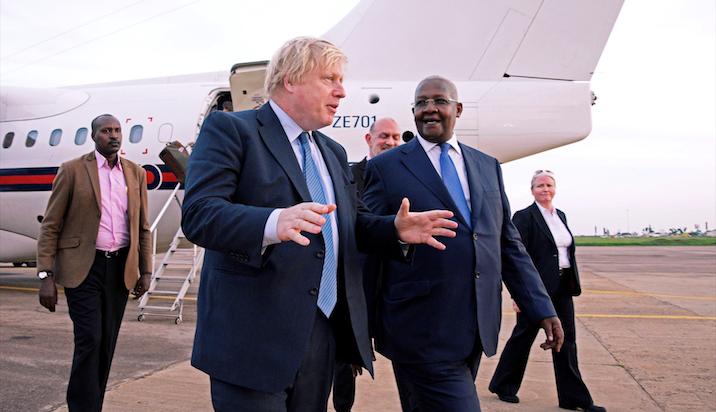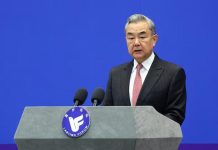Africa-Press – Mauritius. Britain’s exit from the European Union on 31 January creates an imperative for the UK to forge a new set of international alliances and trading arrangements. The UK-Africa Investment Summit on 20 January is one chapter of this new economic diplomacy.
Standing outside Downing Street after winning the premiership in July 2019, Prime Minister Boris Johnson encouraged his government to “start now on those free trade deals – because it is free trade that has done more than anything else to lift billions out of poverty.
” There are also positive signals for those who want to see stronger links emerge between Britain and Africa. UK investment in Africa has risen by 61% since 2008, for example.
UK officials promise to deliver “sustainable investment” that can help African countries break cycles of booms and busts. It will be a challenge. Companies from the UK could once rely on a deep network of contacts and knowledge that emerged from the days of empire.
That ‘institutional memory’ has slowly unravelled – but not everywhere. In Kenya, for example, there are still about 60 large British companies active, including Barclays Bank, British Airways, BAT, Standard Chartered, Diageo, GlaxoSmithKline and BG Group – all of which can be found in many other African markets.
But they are a dwindling band. By the late 1980s, the relationship between the UK and Africa had become negligible – just more than 3% of UK exports went to Africa and less than 2% of UK imports came from the continent.
By the late 1990s, aid had displaced trade as the focus of the UK-Africa relationship. And UK companies now find themselves in a more crowded and competitive marketplace on the continent, too.
So can the UK shift back to a ‘trade, rather than just aid’ agenda? Will British business compete effectively? Nick O’Donohoe, CEO of one of the world’s oldest development finance institutions, the UK’s CDC Group, argues that British companies are up to the challenge.
“We have world-leading technology and expertise in building and executing complex projects, particularly in areas like infrastructure.
We have export finance support, although we’re probably not as mobile or joined up [as China]. ” He raises an important challenge. British companies will compete with Chinese firms, which often are backed by Beijing with solid vendor finance.
Recent joint roadshows of the continent undertaken by the CDC and UK Export Finance are attempts to demonstrate this new commitment to a ‘joined up’ approach.
In 2017, the UK Government created a pan-African trade team led by Emma Wade-Smith with the ambition of helping UK companies large and small access markets across the continent. Beyond seeking new contracts on the road, the UK is also trying to market its financial know-how.
“The London Stock Exchange (LSE) has more bonds from African countries listed or trading than any other international stock exchange,” argues the UK’s Secretary of State for International Development Alok Sharma.
“But we want to do more.
In his role as the UK Prime Minister’s infrastructure envoy for India, Sharma was part of the team that developed the ‘Masala’ bond – a local-currency bond that helped Indian investors insulate themselves from the exchange rate risk inherent in borrowing in foreign currencies.
He wants to bring more the UK’s expertise in the matter to Africa, too. There is already work to build on, including the UK-backed GuarantCo, which helped the first Ghanaian cedi corporate bond from a non-financial actor to list on the Ghana Stock Exchange in May 2018.
Six months later, Quantum Terminal Group listed the bond on the LSE. It was the first local-currency corporate bond from West Africa to list on the LSE.
A new trend emerging in development finance could be a win-win for the continent and the UK. In a world of negative rates and ageing developed-world populations, there is plenty of money searching for yield.
Organisations such as the African Trade Insurance Agency, for example, are bringing in pension funds from the West and elsewhere that are keen to lend to African sovereigns but which are currently unable to because of their fiduciary rules.
Might UK institutions follow their lead? Finance is just the start. For the UK’s largest trading partner on the continent, South Africa, there are many avenues to explore.
Marius Oosthuizen of the Gordon Institute of Business Science wrote in the Daily Maverick that there are three key areas of cooperation: mining, education and next-generation manufacturing. Mining is perhaps the most obvious.
While South Africa no longer has the deep gold reserves that brought British capital to South Africa in the first place, there remains strong potential for iron, chromium, coal and rare earth minerals, among others.
Education and next-generation manufacturing could also see a profitable partnership between South Africa and the UK, too. Both countries have a strong higher-education network, with South Africa home to five of Africa’s top 10 universities, a situation analogous to the UK’s own global higher-education role.
As global innovation pushes at the frontier of high-tech manufacturing both countries are striving to maintain a toehold in the auto, pharmaceutical and chemicals segments, opening the possibility of partnerships between South African and UK companies wishing to set up manufacturing plants nearer to the 2 billion consumers Africa will have in the future.
And with South African firms often the spearhead for expansion to the rest of the continent, might that herald the growth of other UK-Africa partnerships, in industry or services?
That would require a shift in perception at the level of UK business, which occasionally has an out-of-date picture of opportunities on the continent.
Take Morocco for example. “For years, my government saw Morocco as a bit of an exotic place,” the UK ambassador to Morocco, Thomas Reilly, told reporters.
But there are multiple areas the two countries could explore. Morocco now has a thriving aeronautical industry, for example, with more than 140 companies embedded in special economic zones.
Morocco’s green energy sector is also a potential area for collaboration, and offshore finance centre Casablanca Financial City is a clear target for London’s deep bench of lawyers and financial professionals.
It is no surprise then that the UK has been keen to sign a ‘continuity agreement’ with Morocco. “My government sees Morocco as a gateway to Africa. Morocco really knows a lot about Africa, and we know some parts of Africa.
So this deal is really about bringing our strategic relations to the next level,” said Sharma, UK Secretary of State for International Development, meets students in Kenya/all rights reserved
It is, however, too easy to hype potential in Africa. While ministers are keen to point out that by 2050, every fourth consumer in the world will be African, companies have had a more cautious approach.
Doing business in African countries comes with challenges, and even well-established multinationals struggle. Anglo-Dutch giant Unilever issued a profit warning recently, which CEO Alan Jope put down to “challenges in certain markets” including West Africa.
An executive at rival Nestlé – which likewise invested heavily between 2010-2014 – also raised doubts about the growth of Africa’s emergent middle classes.
But another Anglo-Dutch company, Shell, is not pulling in its horns. It recently announced a $15bn spending push in Nigeria, the highlight of which; Bonga Southwest.
Taken in the round, this perhaps acts as a roadmap for UK companies: there is still plenty of potential in commodities, some possibilities in manufacturing old and new, and new prospective markets to explore. A strategic approach to consumer demand remains critical. And the need for local knowledge and partners, essential.
For More News And Analysis About Mauritius Follow Africa-Press







